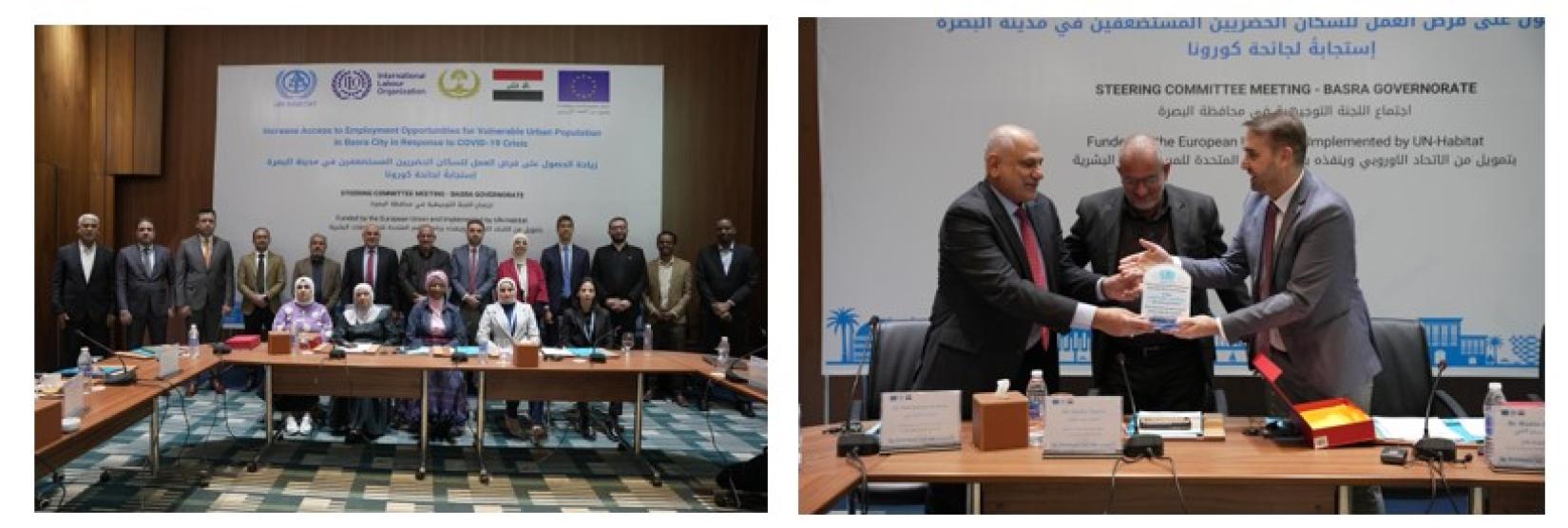Progress in Basra’s Informal Settlements Spotlighted: Offering Inspiration for Sustainable Urban Development in Iraq
٠٥ کانونی یەکەم ٢٠٢٤
Basra, Iraq – 4 December 2024 The 4th Steering Committee Meeting of the 4.5-year project, “Increasing Access to Employment Opportunities for Vulnerable Urban Populations in Basra City in Response to the COVID-19 Crisis,” funded by the European Union, was held in Basra. The meeting highlighted significant achievements in informal settlements, shared lessons learned, and established standards for replicable good practices across Iraq.

Implemented by UN-Habitat in collaboration with local partners and the Basra Governorate, the project has already delivered 90% of its planned objectives, significantly transforming the lives of residents in Kubiya, Al Ahrar, and Jurf Al Melah informal settlements.
The project began in 2021 under challenging circumstances, as part of the European Union’s response to the COVID-19 pandemic in Iraq. Its initial focus was to improve basic living conditions for vulnerable populations, ensuring they could survive the pandemic and recover from its socio-economic impacts. Mr.David Healy, Deputy Ambassador and Head of Political Section of the EU Delegation to Iraq, reflected, “This project started in an emergency context, integrating the European Union’s efforts to address the COVID-19 crisis in Iraq, helping people and places respond to the challenges imposed by the pandemic and strengthening their capacity to recover. To witness so many improvements since 2021 gives us certainty that Basra has today the capacity to develop better than it had before the pandemic. It serves as an example for all of Iraq on how sustainable urban development, socio-economic recovery, and improved management capacities can be effectively integrated.”
In the past nine months alone, critical investments in water, sanitation, and hygiene (WASH) infrastructure have directly improved living conditions for 20,790 residents. The provision of reliable clean water and sanitation facilities, coupled with the ongoing construction of 7.55 km of roads, has enhanced connectivity to services and reduced chronic issues such as flooding with sewage water. Residents in these areas have reliable drinking water supply and protection from seasonal flooding that once disrupted daily life.
A notable achievement underlined at the meeting was the development of the Basra GeoPortal Platform, a cutting-edge data tool that maps underserved areas and guides evidence-based urban planning. Local authorities now rely on the platform to prioritise interventions in informal settlements effectively. Mr. Haider Toama, Mayor of Shatt Al Arab district, lauded the initiative, saying, “Tailored solutions like this demonstrate how informed planning can immediately benefit residents and create a roadmap for good governance across Iraq. It brings us pride to know that Basra now occupies this leading position. We are committed to collaborating with all means available to ensure that the benefits of this initiative are sustained for the long term.”.
The meeting also reviewed the project’s legislative impact. High-level policy dialogues have catalysed the drafting of a National Law on Informal Settlements in Iraq, aimed at formalising access to basic rights and urban services for vulnerable populations. Once enacted, this law promises to extend Basra’s progress into a nationwide model for equitable urban development.
Mr Muslim Qazimi, Head of the UN-Habitat Iraq Programme, reflected on the project’s far-reaching implications: “Thanks to EU support and strong collaboration with Basra authorities, we are not only solving immediate challenges but also creating systems that ensure sustainable urban development, making sure no one and no place is left behind. Basra’s achievements inspire the potential for national transformation. Together, we aim to address the challenges of sustainable urban planning, improve environmental conditions, and enhance services for Basra’s underserved neighbourhoods, especially in informal settlements.”
Equally transformative are the project’s vocational training programmes, developed in partnership with the International Labour Organisation (ILO). Six hundred unemployed men and women have been trained in skills such as sustainable construction techniques, solar energy maintenance, and waste management. These competencies meet local labour market demands while promoting climate-resilient practices, creating better opportunities for long-term employment and environmentally friendly practices.
Ms Maha Kattaa, Head of ILO’s Iraq Country Programme, noted, “This initiative equips individuals with skills to not only secure livelihoods but also to lead sustainable change. The implementation of the ‘Procedures Manual for Employment Departments’ in Basra showcases a replicable framework for employment services that can strengthen labour markets across Iraq.”
The meeting concluded with an announcement of a milestone celebration: the opening of Al Ghadeer Park in Jurf Al Melah on 5 December. The park will serve as a community hub, reflecting the project’s emphasis on creating inclusive and sustainable urban public spaces that promote health and well-being.
As the project moves towards its completion in June 2025, the progress shared at the meeting underscores the potential for innovative, collaborative approaches to address urban challenges across Iraq, leveraging Basra’s experience as a role model for urban sustainable development.
MORE INFORMATION
Juan Valles Robles | Project Manager
email: juan.vallerobles@un.org
Ana Paes | Communication Officer
email: ana.paes@un.org

